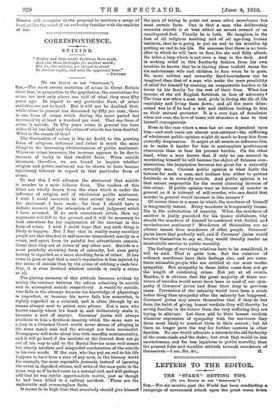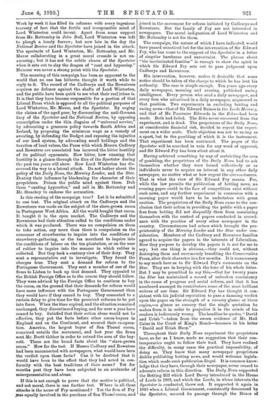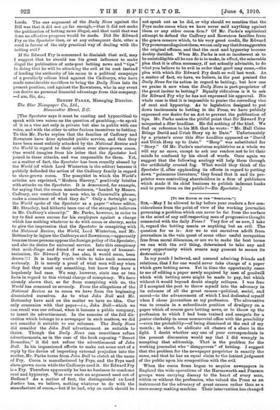LETTERS TO THE EDITOR.
THE " STAR'S" BETTING TIPS.
[TO TER EDITOR 01 TUN " SIPRCTATOR:1
Sin,—For six months past the World has been conducting a campaign of envenomed attack upon the great cocoa firms.
Week by week it has filled its columns with every ingenious travesty of fact that the fertile and irresponsible mind of Lord Winterton could invent. Apart from some support from Mr. Bottomley in John Bull, Lord Winterton was left to plough a lonely furrow; but now late in the day the National Review and the Spectator have joined in the attack. The spectacle of Lord Winterton, Mr. Bottomley, and Mr. Maxse collaborating in a great moral crusade is not un- amusing ; but it has not the subtle charm of the Spectator when it sets out to slay the dragon of "cant and hypocrisy." Humour was never a strong point with the Spectator.
The meaning of this campaign has been so apparent to the world that no one has hitherto thought it worth while to reply to it. The record of the Cadburys and the Rowntrees requires no defence against the shafts of Lord Winterton, and the public have been quick to see what their real:crime is. It is that they have become responsible for a portion of that Liberal Press which is opposed to all the political purposes of Lord Winterton, Mr. Maxse, and the Spectator. By urging the claims of the aged poor, by discounting the anti-German fury of the Spectator and the National Review, by opposing conscription under the thin disguise of "universal service," by advocating a generous policy towards South Africa and Ireland, by proposing the minimum wage as a remedy of sweating, by defending the Budget and exposing the injustice of our land system, by advocating small holdings and the taxation of land -values, the Press with which Messrs. Cadbury and Rowntree are associated has incurred the bitter hostility of its political opponents. How bitter, how cunning that hostility is a glance through the files of the Spectator during the past ten years will show. Now Lord Winterton has dis- covered the way to a lateral attack. Do not bother about the policy of the Daily News, the Morning Leader, and the Star. Destioy their influence by blackening the character of their proprietors. Poison the public mind against them. Dub them " canting hypocrites," and call in Mr. Bottomley and Mr. Strachey to endorse the accusation.
Is this reading of the campaign true ? Let it be submitted to one test. The original attack on the Cadburys and the Rowntrees was made on the subject of the slave-grown cocoa in Portuguese West Africa. All the world bought that cocoa. It bought it in the open market. The Cadburys and the Rowntrees had their attention called to the conditions under which it was produced. There was no compulsion on them to take action, any more than there is compulsion on the consumer of strawberries to inquire into the conditions of strawberry-gathering, or the tea merchant to inquire into the conditions of labour on the tea plantation, or on the user of rubber to inquire into the manner in which rubber is collected. But they took a contrary view of their duty. They sent a representative out to investigate. They found the charges true. They sent a demand for reform to the Portuguese Government. They sent a member of one of the firms to Lisbon to back up that demand. They appealed to the British Foreign Office as to the course they should follow. They were advised by the Foreign Office to continue to buy the cocoa, on the ground that their demands for reform would have more influence with the Portuguese Government than they would have if they ceased to buy. They consented to a certain delay to give time for the promised reforms to be put into force. When the time expired, and the situation remained unchanged, they discontinued buying, and for over a year have ceased to buy. Satisfied that their action alone would not be effective, they put the facts before other cocoa-buyers in England and on the Continent, and secured their co-opera- tion. America, the largest buyer of San Thome cocoa, remained outside the movement, and last year the firms sent Mr. Burtt thither in order to extend the area of the boy- cott. These are the broad facts about the " slave-grown cocoa." Now for the test. If Messrs Cadbury and Rowntree had been unconnected with newspapers, what would have been the verdict upon these facts ? Can it be doubted that it would have been to the effect that they had acted in con- formity with the best traditions of their name ? Yet for months past they have been subjected to an avalanche of misrepresentation and abuse.
If this is not enough to prove that the motive is political, and not moral, there is one further test. W here in all these attacks is the name of Fry mentioned ? Yet the firm of Fry "as equally involved in the purchase of San Thome cocoa, and joined in the movement for reform initiated by Cadburys and Rowntrees. But the family of Fry are not interested in newspapers. The moral indignation of Lord Winterton and Mr. Bottomley is not for them.
The campaign, the nature of which I have indicated, would have passed unnoticed but for the intervention of Sir Edward Fry, who has come to the support of the Spectator in a letter of singular harshness and unrestraint. The phrase about "the incriminated families" is enough to show the spirit in which Sir Edward Fry sets out to pass judgment upon Cadburys and Rowntrees.
His intervention, however, makes it desirable that some notice should be taken of the charge to which he has lent his authority. The case is simple enough. Ten years ago every daily newspaper, morning and evening, published racing intelligence. Every person who read a daily newspaper, and every firm who advertised in a daily newspaper, acquiesced in that position. Two experiments in excluding betting and racing news—that of Sir Edward Baines in the Leeds Mercury, and that of Mr. Passmore Edwards in the Echo—had been made. Both had failed. The Echo never recovered from the experiment, and is dead. The proprietors of the Daily News, at considerable financial risk, decided to repeat the experi- ment on a wider scale. Their objection was not to racing as a sport, but to the gambling of which it is the instrument. That experiment has been continued. The pages of the Spectator will be searched in vain for any word of approval, and Sir Edward Fry has been silent about it.
Having achieved something by way of restricting the area of gambling, the proprietors of the Daily News had to ask themselves whether they were bound collectively or as individuals never to acquire an interest in any other daily newspaper, no matter what or how urgent the circumstances. That is what the view of Sir Edward Fry means. For, while the law permits the publication of betting news, no evening paper could in the face of competition exist without such news, and any further experiment in connexion with a morning paper would have to be undertaken with great caution. The proprietors of the Daily News came to the con- clusion that their action in providing the public with a paper free from betting did not disqualify them from associating themselves with the control of papers conducted in accord- ance with the practice of every other newspaper in the country. Circumstances had arisen which brought the pro- prietorship of the Morning Leader and the Star under con- sideration. Members of the Cadbury and Rowntree families agreed to acquire the papers in the interests of Liberalism. How they purpose to develop the papers it is not for me to say; but one thing is obvious,—they could not, without destroying them and enormously benefiting the Conservative Press, alter their character in a few months. It is unnecessary to say much here as to Sir Edward Fry's comments on the Star. They are in keeping with the tone of his whole letter. But I may be permitted to say this,—that for twenty years the Star has maintained a record of unbroken consistency in the cause of progress and social reform, and that it has numbered amongst its contributors some of the most brilliant writers of our time. Sir Edward Fry has thought it con- sistent with his judicial reputation to pass a damning verdict upon the paper on the strength of a cursory glance at three copies,—a glance so cursory that the single quotation he makes from it in order to prejudice it in the minds of his readers is ludicrously wrong. The headline he quotes, "David and Uriah "—taken from the sworn evidence of Mr. Hall Caine in the Court of King's Bench—becomes in his letter "David and Uriah Heep."
Throughout their Daily News experiment the proprietors have, so far as I know, made no suggestion that their con- temporaries ought to follow their lead. They have realised the difficulty, in many cases the practical impossibility, of doing so. They know that many newspaper proprietors dislike publishing betting news, and would welcome legisla- tion which made such publication illegal. It is common know- ledge that they have, through their newspaper, never ceased to advocate reform in this direction. The Daily News supported the Betting Bill which Lord Davey introduced in the House of Lords in 1903, and which the Lords, in whose interests the Spectator is conducted, threw out. It supported it again in 1903 when a Liberal Government, consistently denounced by the Spectator, secured its passage through the House of.
Lords. The one argument of the Daily News against the Bill was that it did not go far enough, that it did not make the publication of betting news illegal, and that until that was done no effective progress would be made. Did Sir Edward Fry or the Spectator then, or at any subsequent date, utter a word in favour of the only practical way of dealing with the betting evil ?
If Sir Edward Fry is concerned to diminish that evil, may E suggest that he should use his great influence to make illegal the publication of ante-post betting news and " tips." En doing that he will be attacking the evil at its root instead A lending the authority of his name to a political campaign of a peculiarly odious kind against the Cadburys, who have made considerable sacrifices to bring the Daily News into its present position, and against the Rowntrees, who in any event can derive no personal financial advantage from this company. —I am, Sir, &c., Stonecutter Street, E.C.
[The Spectator says it must be canting and hypocritical to speak with two voices on the question of gambling,—to speak of it as a vice not only in private but also in public with one voice, and with the other to utter furious incentives to betting. To this Mr. Parke replies that the families of Cadbury and Rowntree have done splendid public service, and that they have been most unfairly attacked by the National Review and the World in regard to their action over slave-grown cocoa. One would imagine from his letter that the Spectator had joined in these attacks, and was responsible for them. Yet, as a matter of fact, the Spectator has been roundly abused by the World (of which Lord Winterton is the editor) because it publicly defended the action of the Cadbury family in regard to slave-grown cocoa. The pamphlet in which the World's articles are reprinted, " Modern Slavery," positively bristles with attacks on the Spectator. It is denounced, for example, for saying that the cocoa manufacturers, "headed by Messrs. Cadbury, are controlled by men who, in Cromwell's phrase, make a conscience of what they do." Only a fortnight ago the World spoke of the Spectator as a paper " whose editor, Mr. Strachey, had hitherto been one of the strongest believers in Mr. Cadbury's sincerity." Mr. Parke, however, in order to try to find some excuse for his employers against a charge which has nothing whatever to do with cocoa or slavery, seeks to give the impression that the Spectator is conspiring with the National Review, the World, Lord Winterton, and Mr. Bottomley to injure the Cadburys and Rowntrees,—apparently because those persons oppose the foreign policy of the Spectator, and also its desire for universal service. Into this conspiracy that arch-Jingo and friend of war and enemy of humani- tarianism, Sir Edward Fry, has also, it would seem, been drawn!!! It is hardly worth while to take such nonsense seriously. It is merely a proof of what men will say when they feel they must say something, but know they have a hopelessly bad case. We may, however, state one or two facts in regard to this virtual charge of conspiracy. We have already shown that, so far from conspiring with us, the World has censured us severely. From the allegations of the National Review as to cocoa we have from the beginning dissociated ourselves. As to what John, Bull and Mr. Bottomley have said on the matter we have no idea. Our only connexion with that paper—i.e., John Bull—which we can recall was our refusal, when it became a public company, to insert its advertisement. In the exercise of the full dis- cretion which belongs to a newspaper in such matters, we did not consider it suitable to our columns. The Daily News did consider the John Bull advertisement as suitable to theirs. Though the Daily News can sometimes refuse advertisements, as in the case of the book exposing " Secret Remedies," it did not refuse the advertisement of John Bull. In his impassioned efforts to make out some sort of a reply by the device of importing external prejudice into the matter, Mr. Parke turns from John Bull to clutch at the name of Fry. Cocoa is manufactured by Frys, and the Frys used slave-grown cocoa while the Cadburys used it. Sir Edward Fry is a Fry. Therefore apparently he has no business to condemn cant and hypocrisy. Was ever such an argument used out of Bedlam P As a matter of fact, the distinguished ex-Lord Justice has, we believe, nothing whatever to do with the manufacture of cocoa,—but if he had, why on earth should he
not speak out as he did, or why should we mention that the Frys make cocoa when we have never said anything against them or any other cocoa firm ? Of Mr. Parke's sophistical attempt to defend the Cadbury and Rowntree families from the grave censure which, to his very great credit, Sir Edward Fry pronounced against them, we can only say that it exaggerates the original offence, and that the cant and hypocrisy become doubly distilled. When Mr. Parke is not so incoherent as to be unintelligible all he can do is to make, in effect, the miserable plea that it is often necessary, if not actually advisable, to do what you believe to be evil in order that good may come,—the plea with which Si Edward Fry dealt so well last week. As a matter of fact, we have, we believe, in the past praised the Daily News for its action in regard to betting ; but how can we praise it now when the Daily News is part-proprietor of the great inciter to betting ? Equally ridiculous is it to ask Sir Edward Fry why he has not expressed his approval. His whole case is that it is impossible to praise the corroding vice of cant and hypocrisy. As to legislation designed to put down incitements to betting in the Press, we have publicly expressed our desire for an Act to prevent the publication of tips. Mr. Parke makes the pitiful point that Sir Edward Fry misquoted a Star headline. He did nothing of the kind. We find on reference to his MS. that he wrote : " Mr. Hall Caine Brings David and Uriah Story up to Date." Unfortunately by a printer's error this Star headline appeared as "David and Uriah Heep up to Date." "Heep" was substituted for " Story." Of Mr. Parke's unctuous sophistries as a whole we will say no more, except to ask our readers not to let their minds be confused by his cloud of words. Once again we suggest that the following analogy will help them through the artificially created fog. What would they think of the Spectator if, after applauding its efforts in regard to putting down " poisonous literature," they found that it and its pro- prietor were controlling shareholders in a firm of publishers which made it its chief business to publish indecent books and to press them on the public ?---ED. Spectator.]




















































 Previous page
Previous page